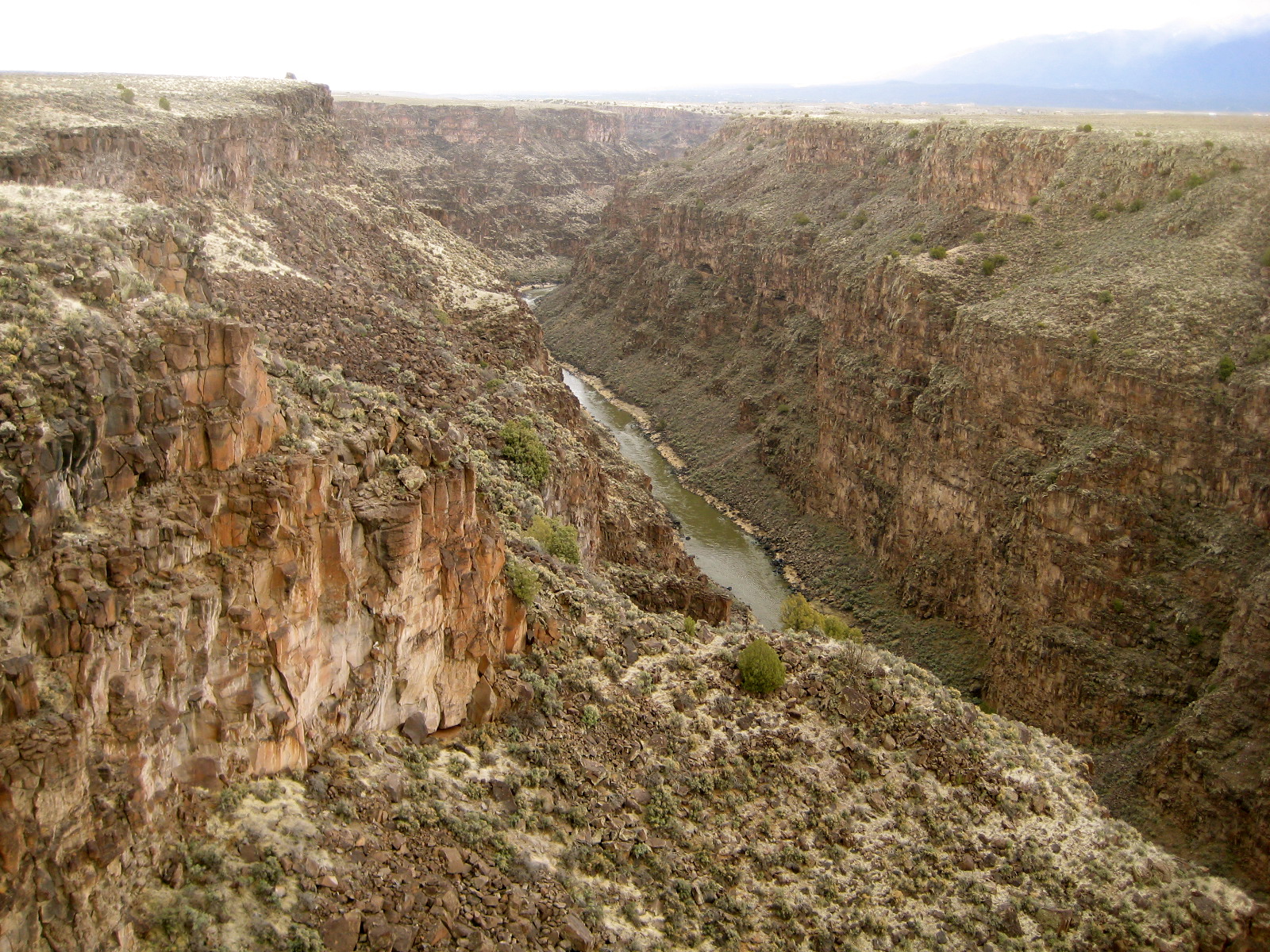A Few Things about Taos

We came into Taos over a steep hill which emptied into a bowl of stripped earth cut in two by the Rio Grande and swaths of sagebrush like a sea green checkerboard over sand. The road down to the river covered the truck in sun mud and we had to cover the same rutted tracks twice to find the water's rim. We hiked straight down into its many layers of brown and found two hippies, naked, brushing through their hair with a comb and a yellow bar of soap. Their dog, Stella, part coyote, sent dust up around herself when she plopped down next to the pool. She was missing one eye. As it turned out, when she stood up, she was missing one leg, too and gave me a breathy smile when I hinged over to push down her pepper hair. The man soaking said she was the best dog he'd ever had.
Back in town, we saw this one woman twice, a mile away from herself. She had long long black hair, a leather jacket, blush that looked like an extra layer of skin, and stories of her son in Boulder where they have “less wind.” That was in the first store where I bought my parents a painted vase, and in the second, where she appeared between rows of orange furniture and tin-framed mirrors, she said we had seen her twin, then said no it was just her again.
Everything was blowing around from Mexican blankets to horsetails to the steep weeded sides leaning into the river as we stood above it on a swaying bridge. Silver jewelry and jars covered in primary colors lined the main strip and the less main ones. Every store we went into, I wondered if we would call ourselves tourists or travelers and if you can separate the two. I wanted a ladder with lots of rungs to hang newspapers and magazines from. Too expensive. There were dried chilis on strings everywhere, and a red-haired woman in a small thrift store who said she wasn't “doing religious” until people kept bringing her icons and paintings and there was such a dreamy peace to them, she gave in.
The Taos Pueblo is also in Taos and it's said to be the oldest, most continuously inhabited community in America. It was shabby. There was a checkpoint to enter and a man in a reflective vest who showed us where we should park. We didn't. I looked behind us as Luke turned the truck around: paper clinging tightly to the corners of mud homes, trees that looked like they had never lived arching over adobe doorways, and tattered advertisements for local guitarists and singers waving their forgotten messages past swirls of leaves. The homes were scattershot with domestic debris, the yards littered with stray dogs.
Over beers and burritos, the bartender who said “you could swing a dead cat and hit a tourist shop in this town” also said he wished he could quit. The leathered local on the corner stool drank only coffee but didn't walk like it. The guacamole with red onions gave me a stomachache. Luke, who talks to everyone, struck it up with the worn men doing tequila shots in the late afternoon. The rich man on a business trip came over to show Luke an iphone photo of the deer he once shot. I drank a can of PBR and settled into my quiet woman-place that only appears when there is talk of hunting and fishing, though I have stories about both.
In the sandy alley, the sky overhead was turning more angry. The sadness–the feeling of flighty spirits and captivity and art trying to portray what's still captive–was coming up at dusk out of the town's turquoise.
When we went back to our casita outside of the city, the swooping crows' wings and the dying breeze were the only sounds near our squat little hot tub. The five or so alpacas next door were grazing lazily, and the last of the sun's strips fell in lines across the gorge and the foot-printed floorboards. Luke cooked catfish in milled corn and lime, and the slight ache of privilege settled in as we drank our spicy wine and the wind started rapping harder on the thin windows.
When we left, the town was under the canopy of oncoming snow, and the same native man pushing the same stocked cart was still pushing away from Taos in the middle of the road. We passed without slowing and an RV moved way into the middle of the highway to avoid contact with the pushcart pilgrim. Today, I read a friend's blog about why he shouldn't write anymore, why what he has to say isn't worth anyone else reading, but I think the saddest stories are the ones that never get told.